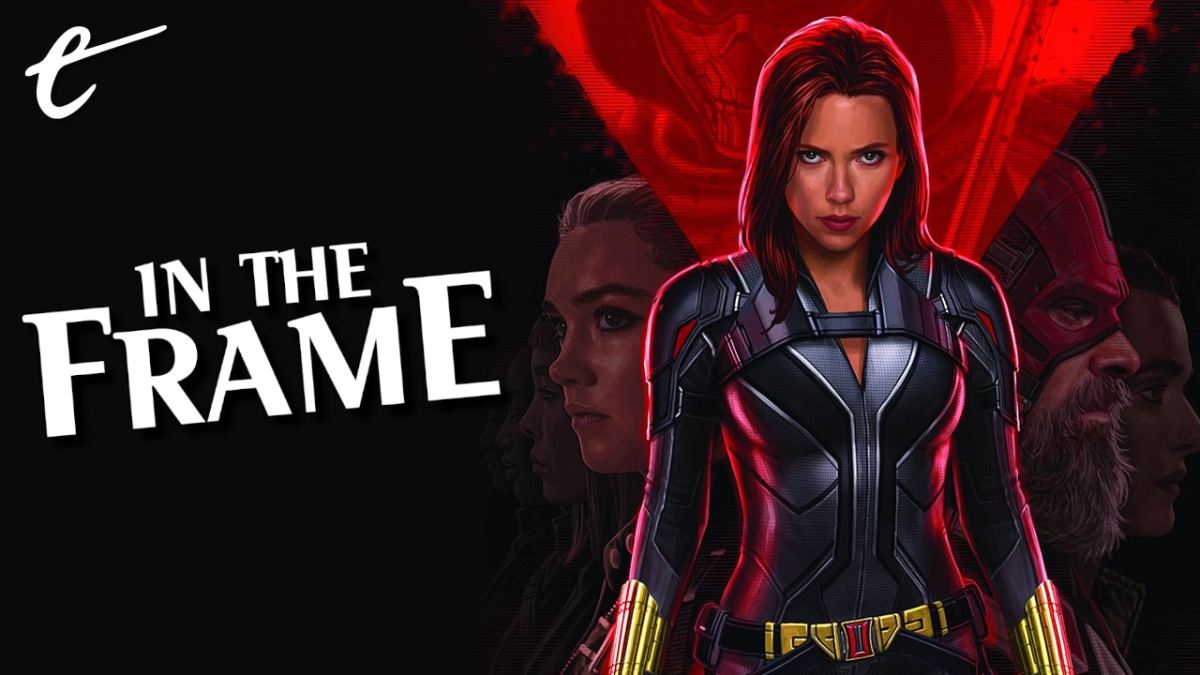This article contains spoilers for Black Widow. If you haven’t seen the film yet and don’t want it spoiled, bookmark this page and come back soon!
Black Widow is a movie about mirroring. It is, in a very literal sense, a film about reflection.
This motif runs through all levels of the film. After all, the entire gimmick of the movie’s superpowered antagonist Taskmaster (Olga Kurylenko) is to mirror the fighting style of their opponent. At several points, Taskmaster fights Natasha Romanoff (Scarlett Johansson) to a standstill by simply reflecting the trained assassin’s moves back at her. When Natasha reunites with her surrogate sister Yelena Belova (Florence Pugh), the two match each other literally move for move.
There is a strong recurring sense in Black Widow that “we have met the enemy and he is us.” After all, the entire plot of the movie is driven by Natasha’s discovery that the sinister Red Room that trained her is still active and has begun mass producing Black Widows. Since the fall of the Berlin Wall, the Red Room has produced an army of young women dressed in skintight black catsuits, an assembly line designed to churn out disposable copies of the eponymous character.
There are times when Black Widow feels recursive. Owing to the character’s fate in Avengers: Endgame, the solo movie unfolds in the gap between Captain America: Civil War and Avengers: Infinity War, with the dialogue taking every opportunity to remind audiences that Natasha’s superhero team is going through a breakup or a divorce. The entire premise of Black Widow is that Natasha winds up recovering from the loss of one surrogate family by reconstructing another.

Black Widow opens with a flashback to Ohio in 1995, revealing that Natasha lived undercover in the United States with a fake family of Russian sleeper agents. Russian superhero Alexei Shostakov (David Harbour) and Red Room architect Melina Vostokoff (Rachel Weisz) posed as Natasha’s parents, with Yelena raised as her younger sister. This illusion of domesticity is shattered when their cover is blown, the family forced to flee to Cuba where they are broken up.
As Natasha delves into the Red Room in the current day, she is forced to bring that shattered superheroic family back together. The movie positions them as a potential replacement for the Avengers within Natasha’s life, with Yelena even noting that their mission would be much easier if Natasha were still on speaking terms with Tony Stark (Robert Downey Jr.). It is interesting how Black Widow leans into these comparisons.
Black Widow is constantly invoking the iconography of other Marvel Cinematic Universe properties. Alexei Shostakov is the Russian superhero Red Guardian, a Soviet version of Captain America. Their costumes are very similar in design. Whereas Steve Rogers (Chris Evans) spent decades in the ice, Black Widow reveals that Alexei spent an extended period on ice in a Russian prison in the Siberian wilderness. Alexei does not consider Steve his nemesis, but a contemporary and even a colleague.
There are beats that invite comparisons to earlier films featuring Natasha. The family find Melina living a life of domestic bliss on a remote farm, recalling the Barton homestead in Avengers: Age of Ultron. The motif of characters being mind-controlled to do something horrid directly recall’s Loki’s (Tom Hiddleston) manipulation of Clint Barton (Jeremy Renner) in The Avengers. The climax involves Natasha getting into a key location by masking her face, as in Captain America: The Winter Soldier.

The Winter Soldier is a particular touchstone for Black Widow, putting Natasha through something similar to Steve’s arc in that film. Early in Black Widow, it is revealed that Natasha killed a child during her escape from the Red Room, a choice that has haunted her ever since. However, it is subsequently revealed that the child did not die; she was reconstructed as the mind-controlled cyborg assassin Taskmaster, like Bucky (Sebastian Stan) became the Winter Soldier. Natasha doesn’t want to defeat or kill her opponent, but instead to break her free of her programming.
Black Widow’s treatment of the villainous Dreykov (Ray Winstone) is particularly noteworthy. Dreykov is the mysterious head of the Red Room. Within Black Widow, he is constantly paralleled with United States Secretary of State Thaddeus “Thunderbolt” Ross (William Hurt). The two characters are introduced on either side of the opening credits as embodiments of state power. In the opening flashback sequence, Dreykov even has a big bushy moustache to more directly mirror Ross.
Over the course of Black Widow, as the movie delves into the Red Room, it suggests some uncomfortable parallels. It is revealed that Natasha could not find the Red Room because the facility is no longer on Earth. Dreykov moved the operation into a floating base of operations in the clouds, which directly evokes the Helicarrier from The Avengers. Indeed, the climax of the movie even features the heroes smashing one of the turbines, as in The Avengers.
Paralleling Dreykov’s work in the Red Room with the superheroism of the Avengers presents a solid premise. Dreykov has essentially turned the ugly business of statecraft into a mass-produced brand, suggesting that the real power in this fictional world no longer lies with governments or elected officials, but in those who literally and figuratively position themselves above mankind with the will and the power to shape the world beneath them.

Yet Black Widow never really delves into the substantive implications of this mirroring. At the climax, during her big confrontation with Dreykov, it seems like Natasha’s biggest problem with Dreykov’s abuse of power is that he chooses to “rule from the shadows” and “hide in the dark” rather than publicly flaunting his disregard for basic laws by presumably destroying airports and tearing through Berlin. There is reflection in Black Widow, but there is no introspection.
That said, there are some other compelling ideas at play within this mirroring. Given Natasha’s status as a former Russian agent, Black Widow is fascinated with post-Cold War Russia. Early in the film, it is revealed that Natasha is a fan of James Bond movies, watching Moonraker in her spare time. Appropriately enough, director Cate Shortland lifts several early sequences directly from GoldenEye, a James Bond movie explicitly about the post-Cold War New World Order.
One of the big recurring themes in Hollywood’s explorations of Russia following the collapse of the Berlin Wall is the nation’s complicated embrace of capitalism as an ideology. It’s notable that even a lot of the terminology around this transition deliberately mirrored American history, with commentators in the late 1980s talking about how Russia was entering its “Wild West phase.” With the end of communism, the narrative became that Russia was competing on American terms.
Of course, the reality of the situation is somewhat more complicated. Commentators have suggested that while the modern Russian state is no longer championing an ideology directly opposed to American principles, it has instead embraced a sort of political opportunism dedicated to “an asymmetric assault” on the foundational principles of American political ideology that has arguably managed to turn “American democracy against itself.”

Black Widow builds on these ideas. Dreykov is a variant on the familiar modern Russian villain archetype embodied by Sator (Kenneth Branagh) in Tenet, an adversary for the post-state era. The opening credits include photographs of Dreykov freely associating with both Bill Clinton and Vladimir Putin. This is the sort of blurring of boundaries that occurs in a world where a sitting American president casually meets with his Russian counterpart without any note-taker or translator.
Dreykov is particularly dangerous because he has found a way to weaponize “the key to free will,” to turn young people around the world into soldiers. There is a certain conspiracism to Black Widow and its portrayal of Dreykov, presenting the character as a puppet master capable of manipulating people into acting against their own best interests. It recalls the most facile theories that blame modern political uncertainty entirely on “Russian meddling,” ignoring more complicated factors.
Early in Black Widow, Shortland invokes a key sequence from Steven Spielberg’s Munich. An assassin plants a bomb in an apartment, only to spot a child through the window. In Munich, the characters race to stop the bomb going off and save the child. In Black Widow, Natasha detonates the bomb and seems to kill the child. Directly referencing Munich is a bold choice for a superhero movie like this, as Munich was “a dark, unflinching portrait of moral ambiguity” in which blood stains don’t wash off easily.
At its best, Black Widow suggests something murky and unsettling about the world through which its protagonist moves. Natasha navigates a world of shattered mirrors and warped reflections, where the villains are often difficult to delineate from the heroes. Unfortunately, Black Widow cannot commit to the more interesting implications of these ideas, even going out of its way to deliberately walk back Natasha’s decision to detonate that bomb. Black Widow flinches.
Still, at least the ideas themselves are interesting.






Published: Jul 9, 2021 11:00 am